Evangelism
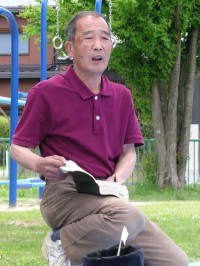 Jesus has called his church to spread the good news of salvation through him to the whole world. Most Japanese have no understanding of who Jesus is or what he came to accomplish. They, like the rest of humanity, are self-deceived, wrapped up in their sins, and subject to the wrath of a holy, all-powerful God. Our first task as missionaries is to introduce them to the gospel of Jesus Christ which can set them free and give them forgiveness, hope, purpose, and eternal life. In Japan, there are numerous barriers to overcome in conveying the gospel message to unbelievers. Some of the basic terms necessary for explaining the gospel are not easily understood. The Japanese word used for "God", for example, is kami, which refers to a great spirit, one god among the many in this polytheistic/pantheistic society. So in introducing the gospel it is helpful to start with the story of creation and first introduce the God who made the world and everything in it. Another difficult concept is sin. The word for "sin" in Japanese, tsumi, is the same as the word for "crime". In the context of our relationship with the God who created us and established a moral law we must follow, this makes sense, but most Japanese have a difficult time seeing themselves as sinners. This is partly because Japanese society emphasizes conformity to people around them rather than to any absolute moral standard. This means that shame is often more of a factor in decision making than guilt or inner conviction.
Jesus has called his church to spread the good news of salvation through him to the whole world. Most Japanese have no understanding of who Jesus is or what he came to accomplish. They, like the rest of humanity, are self-deceived, wrapped up in their sins, and subject to the wrath of a holy, all-powerful God. Our first task as missionaries is to introduce them to the gospel of Jesus Christ which can set them free and give them forgiveness, hope, purpose, and eternal life. In Japan, there are numerous barriers to overcome in conveying the gospel message to unbelievers. Some of the basic terms necessary for explaining the gospel are not easily understood. The Japanese word used for "God", for example, is kami, which refers to a great spirit, one god among the many in this polytheistic/pantheistic society. So in introducing the gospel it is helpful to start with the story of creation and first introduce the God who made the world and everything in it. Another difficult concept is sin. The word for "sin" in Japanese, tsumi, is the same as the word for "crime". In the context of our relationship with the God who created us and established a moral law we must follow, this makes sense, but most Japanese have a difficult time seeing themselves as sinners. This is partly because Japanese society emphasizes conformity to people around them rather than to any absolute moral standard. This means that shame is often more of a factor in decision making than guilt or inner conviction.
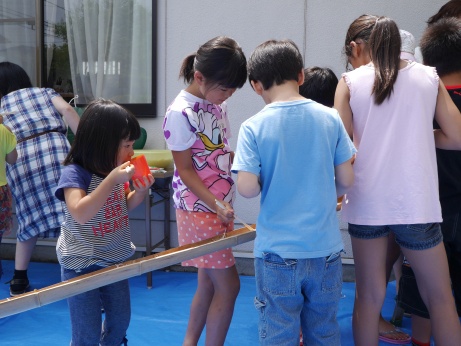
Since most Japanese have little interest in the Bible or Christianity, we look for creative ways to expose them to the gospel. 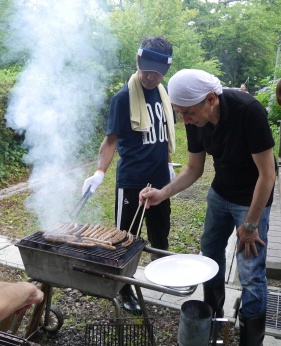 We hold concerts, cooking classes, English classes, seminars, parties. All sorts of occasions can serve as opportunities to introduce people to the life-changing message of Jesus. Just stepping in the door of a church building is intimidating for many Japanese, but if they can be part of a Christian gathering in a non-threatening atmosphere it may make it easier to come back.
We hold concerts, cooking classes, English classes, seminars, parties. All sorts of occasions can serve as opportunities to introduce people to the life-changing message of Jesus. Just stepping in the door of a church building is intimidating for many Japanese, but if they can be part of a Christian gathering in a non-threatening atmosphere it may make it easier to come back.
The Bible
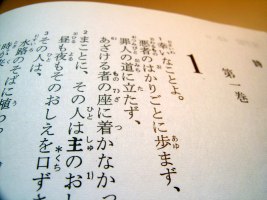 The Bible is the basis of all that we do. It is the foundation of our lives, the centerpiece of our teaching, and the guidebook of our ministry. We believe that the Bible is the Word of God and that just as God himself cannot make mistakes, so he caused the Scriptures to be written without any errors. In Japan, people believe in many gods, so when we talk with unbelievers we need to be careful to point out that the God we are talking about is not one god of many, but the God of the Bible, the almighty Creator of the universe. When we introduce Jesus to them, we introduce not a Jesus of our imagination or a hypothetical reconstruction of Jesus based on dubious documents and conjecture but the Jesus who is clearly described in the Gospels. This is the Jesus who offers real hope to Japan. A good teacher who left behind an influential tradition is not what the people of Japan need. The Jesus of the Bible is what the people of Japan need. This Jesus is God's Son who died to save sinners, who came back to life three days later as he predicted, and who now sits at God's right hand to intercede on behalf of those who believe in him. This is the Jesus who deserves our worship and who will one day return to judge the world in righteousness. The living Jesus who is accurately depicted in the pages of Scripture is the one who has the power to change lives and revolutionize society.
The Bible is the basis of all that we do. It is the foundation of our lives, the centerpiece of our teaching, and the guidebook of our ministry. We believe that the Bible is the Word of God and that just as God himself cannot make mistakes, so he caused the Scriptures to be written without any errors. In Japan, people believe in many gods, so when we talk with unbelievers we need to be careful to point out that the God we are talking about is not one god of many, but the God of the Bible, the almighty Creator of the universe. When we introduce Jesus to them, we introduce not a Jesus of our imagination or a hypothetical reconstruction of Jesus based on dubious documents and conjecture but the Jesus who is clearly described in the Gospels. This is the Jesus who offers real hope to Japan. A good teacher who left behind an influential tradition is not what the people of Japan need. The Jesus of the Bible is what the people of Japan need. This Jesus is God's Son who died to save sinners, who came back to life three days later as he predicted, and who now sits at God's right hand to intercede on behalf of those who believe in him. This is the Jesus who deserves our worship and who will one day return to judge the world in righteousness. The living Jesus who is accurately depicted in the pages of Scripture is the one who has the power to change lives and revolutionize society.
This is why we love to introduce people to the Bible. People come to know Jesus through the Bible. When we teach and preach, we encourage people to check what we say against the Bible. We would not want them to take our word for it without having confidence that that is what God's Word teaches. So we constantly point people back to the Bible and encourage them to study it for themselves.
Our Current Place of Service
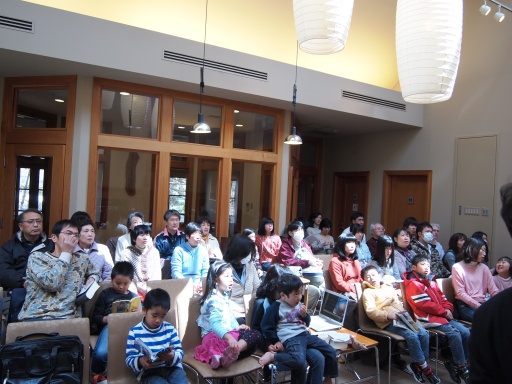 Since 2018 we have served at Izumi Park Town Christian Church. This church had been under missionary leadership for a long time and had finally become independent and called their own pastor, but had gone through some struggles after that and had lost about half its members in the couple years before we arrived. Our job is to build it back up to a point of healthy independence.
Since 2018 we have served at Izumi Park Town Christian Church. This church had been under missionary leadership for a long time and had finally become independent and called their own pastor, but had gone through some struggles after that and had lost about half its members in the couple years before we arrived. Our job is to build it back up to a point of healthy independence.
When we moved back to Sendai in 2014 our son Leo was five years old and one of the first things we did was find a kindergarten for him to enroll in. In our new neighborhood was a very well respected kindergarten, but they were already full and it was clear that there was little chance of getting our son enrolled there. We found another kindergarten associated with a so-called "mission school," a university that had been founded years ago by Protestant missionaries. Although there were few Christians at the school, they maintained Christian traditions, taught the children Bible stories, and showed them how to pray in Jesus' name. We had some misgivings about enrolling Leo in a kindergarten that had only a facade of Christianity, but eventually did so. This turned out to be a great blessing since a number of Leo's classmates ended up coming to our children's outreach events.
Our Family
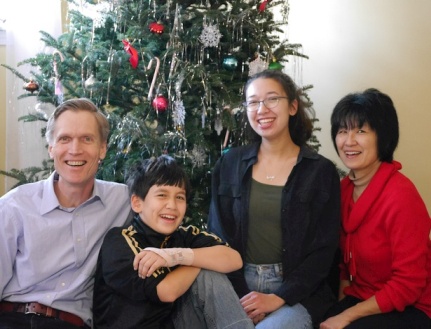 Leo and his classmates have now grown up and are in junior high school. His big sister is away at college in the U.S., but Leo continues to contribute in his own way to our ministry just by being who he is and being part of our Christian home. Many children in non-Christian families in Japan have a father who either lives far away because of a job assignment or a divorce or is so busy with work that he only sees his children on the weekend. Many marriages are cold and are endured rather than treasured. Often parents let outside pressures of school or society dictate how their children will behave rather than giving them any clear, direct moral guidance. An example of a Christian home combined with Biblical teaching about the home and family are an important part of strengthening the church, as well as being a means of demonstrating the power of the gospel in the community.
Leo and his classmates have now grown up and are in junior high school. His big sister is away at college in the U.S., but Leo continues to contribute in his own way to our ministry just by being who he is and being part of our Christian home. Many children in non-Christian families in Japan have a father who either lives far away because of a job assignment or a divorce or is so busy with work that he only sees his children on the weekend. Many marriages are cold and are endured rather than treasured. Often parents let outside pressures of school or society dictate how their children will behave rather than giving them any clear, direct moral guidance. An example of a Christian home combined with Biblical teaching about the home and family are an important part of strengthening the church, as well as being a means of demonstrating the power of the gospel in the community.
More About Us: Why We Do What We Do
